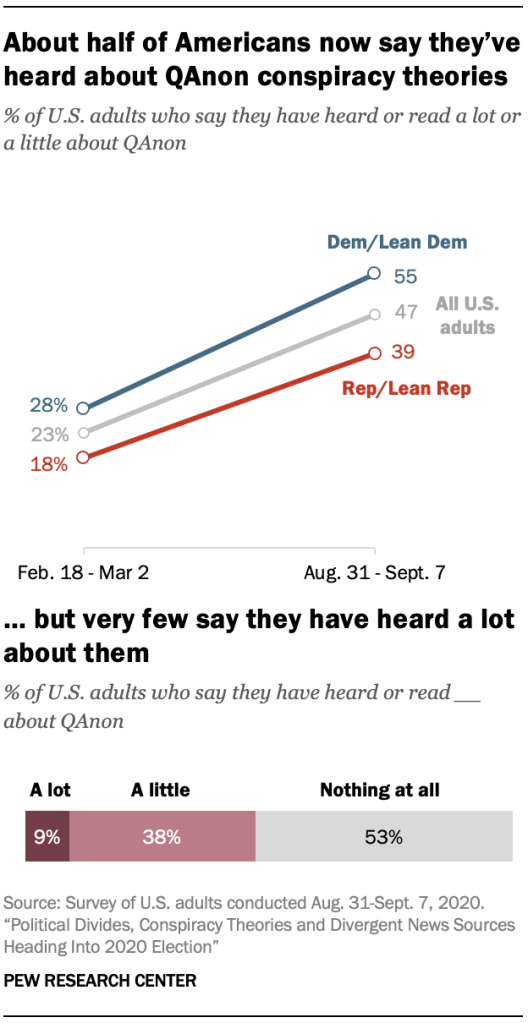
Americans’ awareness of a collection of conspiracy theories known as QAnon has roughly doubled since March to nearly half of U.S. adults.2 A solid majority of those who have heard about QAnon say it is a bad thing for the country and also say Donald Trump seems to support people who promote the theories. Those sentiments, however, are not shared equally across party or among those with differing sources for political news.
Originating on message boards, the cluster of conspiracy theories connected to QAnon have now been declared a domestic terror threat by the FBI, publicly espoused by congressional candidates and talked about with interest by Trump.
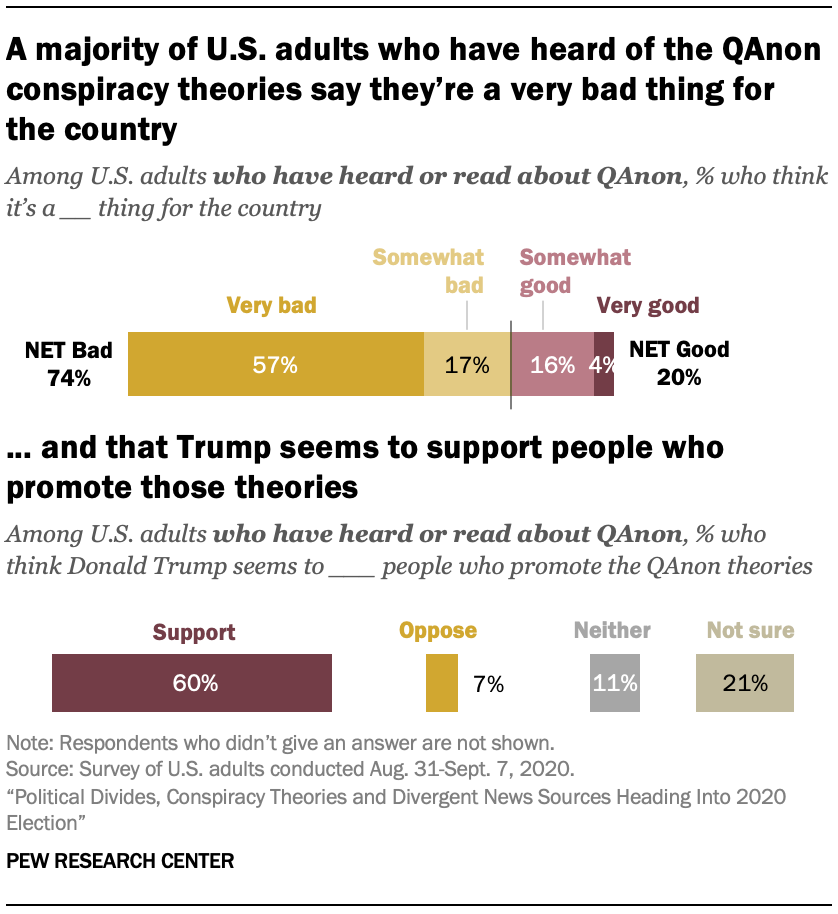
While few U.S. adults – just 9% – have heard a lot about this group of conspiracy theories, far more (38%) have heard at least a little, amounting to roughly half (47%) of Americans who are familiar with QAnon. That figure has roughly doubled since early March, when 23% had heard at least a little about it.
Among those who are aware of QAnon, 57% say it is a “very bad” thing for the country. Another 17% say it is “somewhat bad,” for a total of 74% who see it as bad for the country. That compares with 20% who say it is somewhat or very good thing (6% did not answer).
A solid majority of Americans who have heard of the theories (60%) also say that Trump seems to support individuals who promote those conspiracy theories, such as Marjorie Taylor Greene, who recently won the Republican primary in Georgia for a U.S. House seat and campaigned publicly on some of these themes. Just 7% say Trump seems to oppose people who promote these theories, while 11% say he neither opposes or supports them and the remainder say they are unsure (21%).
One node of these conspiracy theories makes unfounded accusations about high-level officials and pedophilia. While about half (47%) of U.S. adults have heard at least a little about QAnon specifically, about seven-in-ten (71%) have heard or read news coverage about the extent of child abuse or trafficking. While many of these stories may be about fact-based examples of these problems, the high share registered here may also suggest that some of these conspiracy theories may be reaching Americans beyond just those who know of QAnon by name.
Sizable minority of Republicans who have heard about QAnon say it is a good thing for the country
Democrats’ awareness of the QAnon conspiracy theories somewhat outpaces that of Republicans (55% and 39%, respectfully), and there are larger party differences when it comes to their views about QAnon.
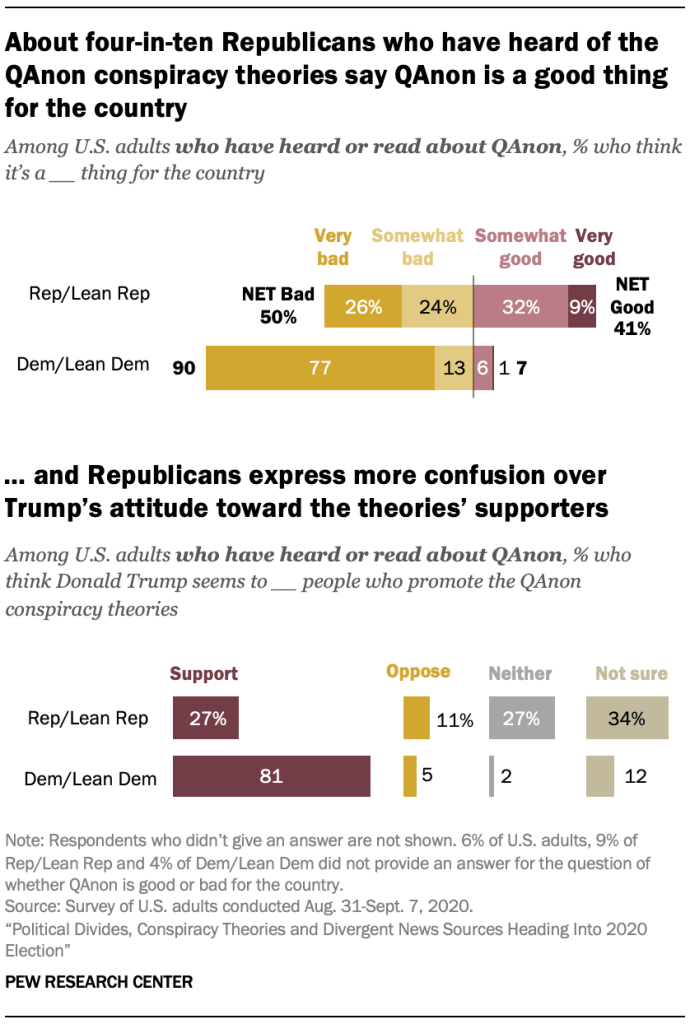
Fully 77% of Democrats who have heard of QAnon say it is a “very bad” thing for the country, and another 13% say it is a somewhat bad thing. That feeling is shared by far fewer Republicans. Only about a quarter of Republicans (26%) who have heard of QAnon feel it is a very bad for the country, while another 24% say it is somewhat bad. Indeed, roughly four-in-ten Republicans who have heard of QAnon (41%) say it is a good thing for the country (32% somewhat good and 9% very good).
Democrats are also much more likely than Republicans to say that, based on what they’ve seen or heard, Trump seems to support people who promote QAnon theories – though few Republicans say he opposes them. Roughly eight-in-ten Democrats who have heard of QAnon (81%) say that Trump seems to support people who promote those theories. Republicans who are aware of QAnon express much greater uncertainty about where the president stands. The largest segment of Republicans say that based on what they’ve seen or heard they are not sure where Trump stands. Another 27% say he seems to neither support nor oppose them. The same percentage (27%) say he seems to support them, more than twice as many as the 11% who say he opposes people who promote the QAnon conspiracy theories.
Democrats relying on news outlets with left-leaning audiences are the most aware of QAnon
Awareness of QAnon varies broadly across the news sources Americans use as their major sources for political and election news – ranging from nearly 80% to less than a third across types of news consumers.
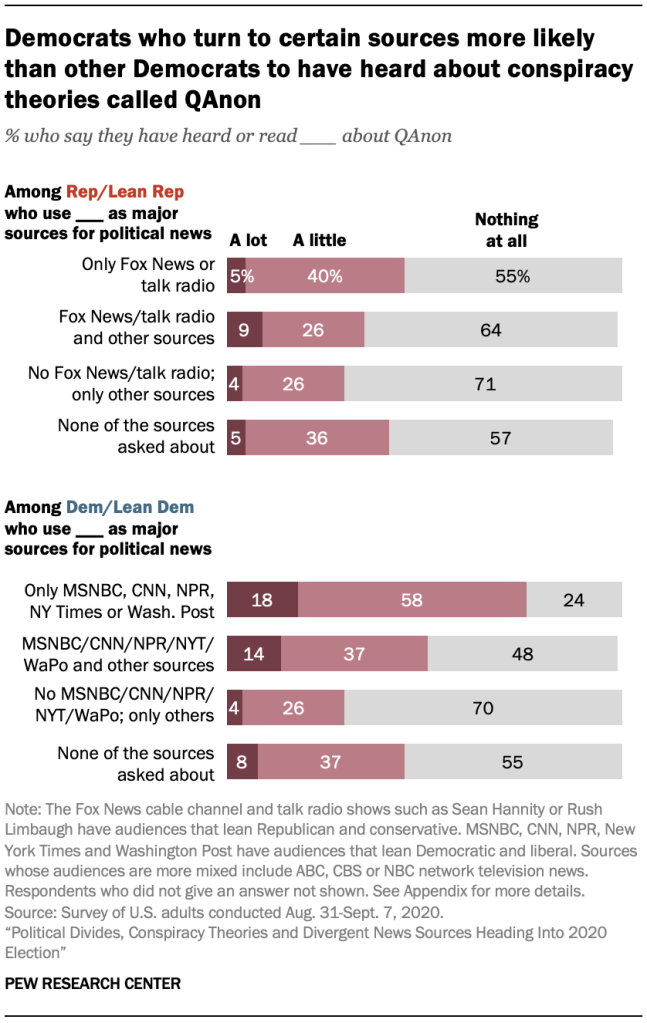
Democrats and independents who lean toward the Democratic Party who use only news outlets with left-leaning audiences (MSNBC, CNN, NPR, The New York Times or The Washington Post) as major sources for political and election news are the most aware of QAnon: Fully 76% of this group say they have heard at least a little about these conspiracy theories, though fewer than one-in-five (18%) say they have heard a lot about them. About half (51%) of Democrats who use these outlets with left-leaning audiences plus other outlets (either Fox News, national broadcast TV news or talk radio) have heard about QAnon, while 45% of Democrats who do not use any of the outlets asked on the survey as major sources say they have heard of QAnon at least a little. Democrats who use only outlets other than those with left-leaning audiences are the least aware in their party: 29% have heard about QAnon.

Awareness of QAnon is highest among Republicans and Republican leaners who either only cite outlets with right-leaning audiences (Fox News or talk radio) as major sources or do not use any of the outlets asked about (45% and 42%, respectively, have heard at least a little). About a third of Republicans who use outlets with mixed or left-leaning audiences in addition to Fox News or talk radio (35%) have heard about QAnon, as have about three-in-ten (29%) Republicans who do not use outlets with right-leaning audiences (see the appendix for more details).
Republicans who rely on Trump and his campaign as a major election news source are somewhat more likely to see the QAnon conspiracies as positive for the country
Republicans who say Donald Trump and his campaign are a major source of political news for them are somewhat more likely than other Republicans in their view of the QAnon conspiracy theories. Among Democrats, however – and again as seen with the question of voter fraud – those who turn to Biden and his campaign as a major source for political news show little difference in this question.
Republicans who have heard of QAnon (including those who lean Republican) and for whom the Trump campaign is a major source are somewhat more likely than other Republicans to view QAnon as a positive thing for the country. Indeed, 46% of Republicans who call Trump and his campaign a major source of news say QAnon is either a very good (15%) or a somewhat good (31%) thing for the country. Among other Republicans – those who do not call Trump and the campaign a major news source – only 7% say QAnon is a very good thing, with another 33% who say it is a somewhat good thing – for a total of 39% who put it in a positive category.
Among Democrats, there is no difference across any of the four responses options between those who turn to Biden and his campaign as a major source for news and those who do not.
Young adults no more likely to have heard of QAnon
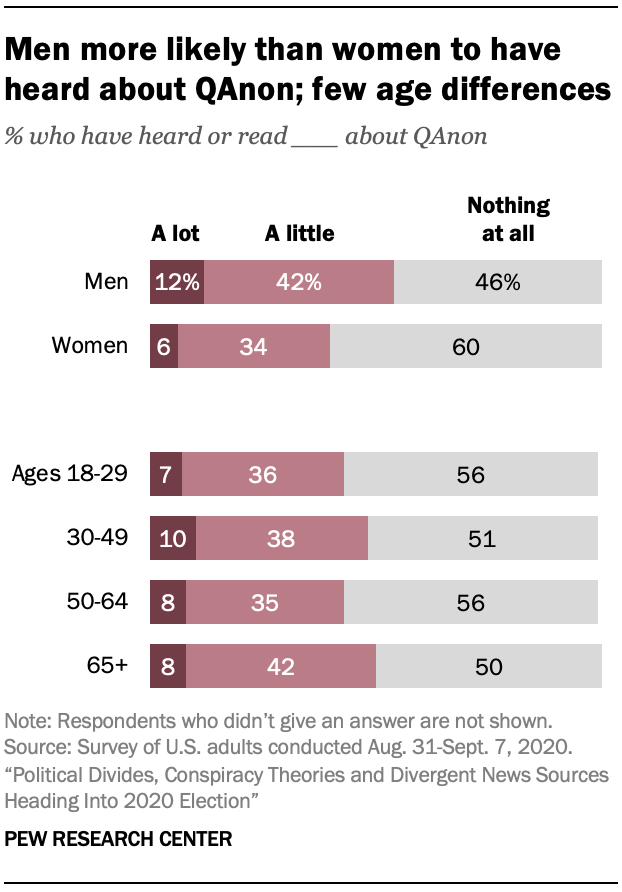
More than half of men in the U.S (54%) have heard at least a little about the conspiracy theory compared with 39% of women. But when it comes it age, few differences emerge. Between 43% and 50% of all age groups have heard at least a little about QAnon, with no more than 10% in any group who have heard a lot.
Among those who have heard about the conspiracy theories, adults under 30 are the most likely to say it is a good thing: 29% of those ages 18 to 29 say this, compared with 20% or less of any other age group.
More comparative data on these questions can be found in the American News Pathways data tool.
Republicans more likely than Democrats to say activist groups and journalists create a lot of completely made-up election news
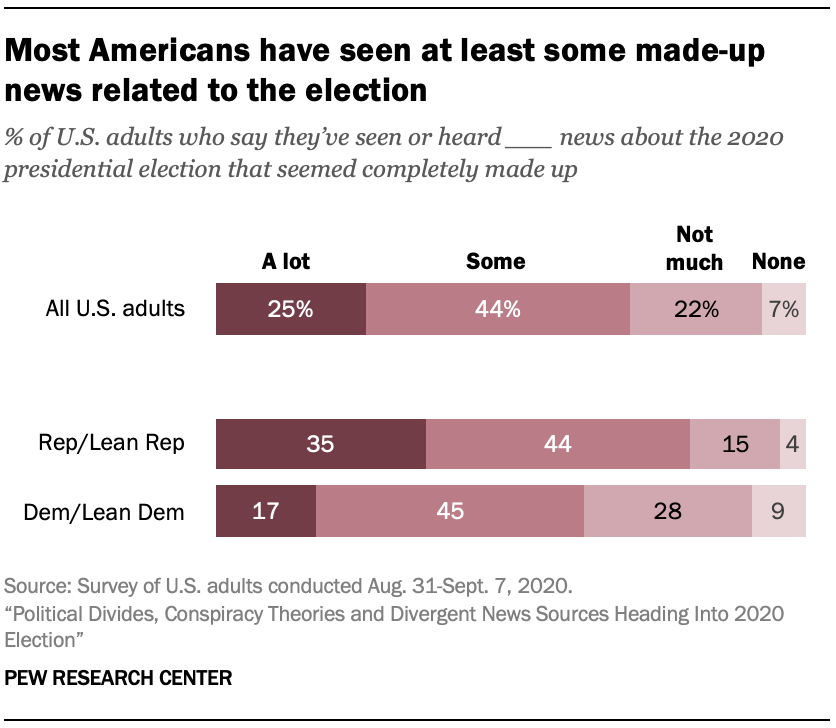
Many Americans say they have come across made-up news related to the 2020 presidential election, though this differs depending on where people get their political news. There are also party-line differences, including who each side sees as the main creators of made-up news.
About seven-in-ten U.S. adults (69%) say they have come across at least some completely made-up news related to the election.
That breaks down to a quarter who say they have come across a lot and 44% who say they’ve come across some. Another 22% say they’ve come across “not much,” while only 7% say they’ve seen no made-up election news at all.
As past research has found, Republicans and those who lean Republican are more likely to say they’ve come across completely made-up news than their Democratic counterparts. About a third of Republicans (35%) say they’ve seen a lot while another 44% have seen some. About half as many Democrats and Democratic leaners (17%) say they’ve seen a lot, and 45% have seen some.
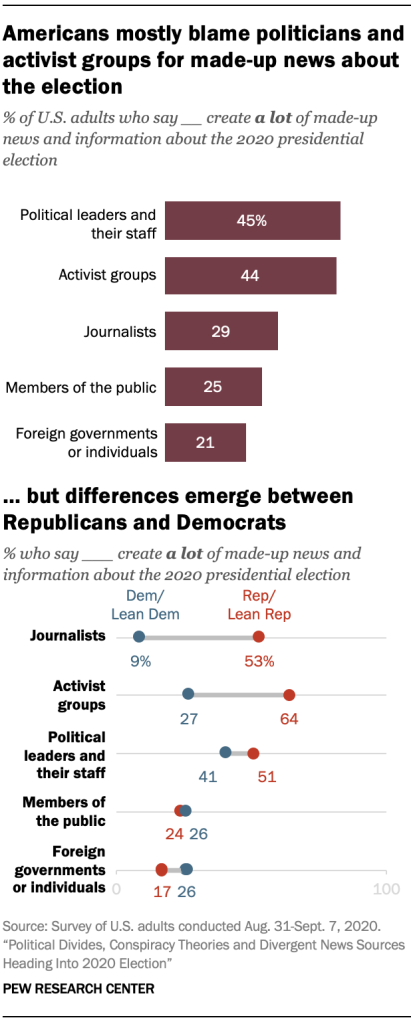
Bigger differences emerge in who each partisan group thinks creates a lot of made-up news related to the 2020 election.
Overall, Americans put the greatest blame on political leaders and their staff as well as activist groups. Just under half say that each of these groups creates a lot of completely made-up news related to election 2020. About three-in-ten (29%) say journalists create a lot of it, while a quarter say this of members of the public. And, similar to an earlier study, despite warnings from the U.S. counterintelligence agency that foreign nations are trying to influence U.S. voters, foreign governments or foreign individuals get the least blame among the groups asked about: 21% of U.S. adults say these governments or individuals create a lot of made-up news related to the 2020 election.
Republicans are far more likely than Democrats to blame activist groups and journalists for the creation of made-up news. About two-thirds of Republicans (64%) say activist groups create a lot of completely made-up election news, while 53% say this of journalists. Democrats are far less likely to call out either of these groups, with 27% saying activist groups create a lot and 9% saying this of journalists. Republicans are also somewhat more likely to say that made-up election news comes from political leaders and their staff (51% vs. 41% of Democrats). Democrats place somewhat more blame on foreign governments than Republicans do, but by a narrow margin (26% and 17% respectively).
The one area of partisan agreement lay in the role the public plays. About a quarter of both Republicans and Democrats say members of the public create a lot of made-up news about the presidential election.
Republicans with different media diets see different amounts, creators of made-up news
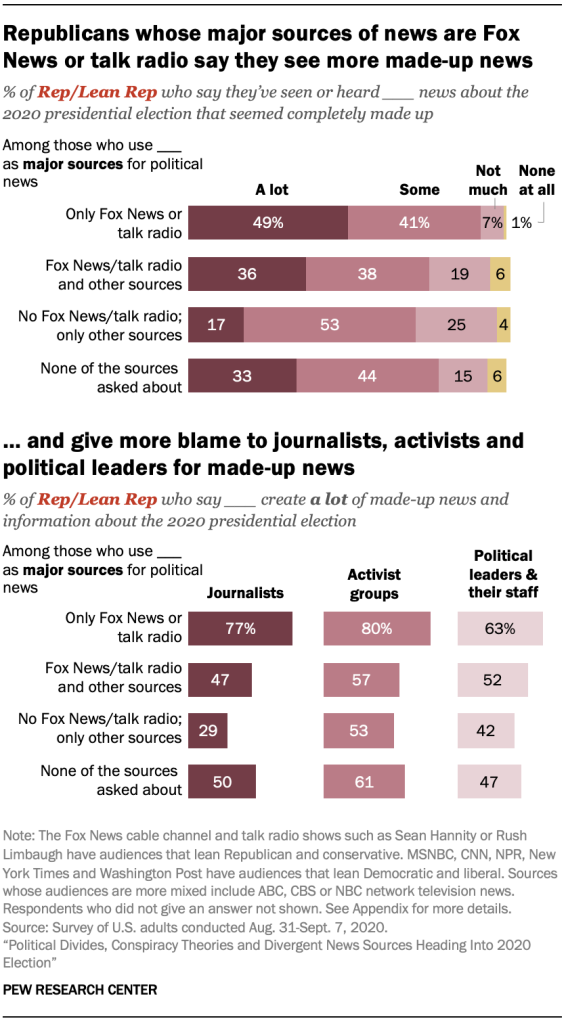
Democrats (and independents who lean Democratic) with different media diets show only modest differences in their perception of made-up election news. That is not the case among Republicans and Republican leaners: There are wide gaps between Republicans who say Fox News or talk radio are their major sources for political news and Republicans who turn to outlets with less conservative audiences.
About half of Republicans who, among the eight sources asked about, rely only on Fox News or talk radio for political news (49%) say they have seen or heard “a lot” of news and information that seemed completely made up. About a third or fewer among Republicans who use these two outlets as major sources in addition to others (36%) or do not rely on any of these outlets (33%) say they have seen a lot. Republicans who rely only on news outlets other than Fox News and talk radio (17%) are the least likely in their party to say they’ve seen a lot.
In addition, Republicans who use only Fox News or talk radio as major sources are more likely than others in the party to say journalists, activist groups and political leaders or their staffs create a lot of made-up news and information. For example, 77% of these Republicans say journalists create a lot of made-up news, compared with half or fewer of Republicans with other major sources or none at all.
Republicans who say Trump is a major source of news are more critical of journalists than other Republicans
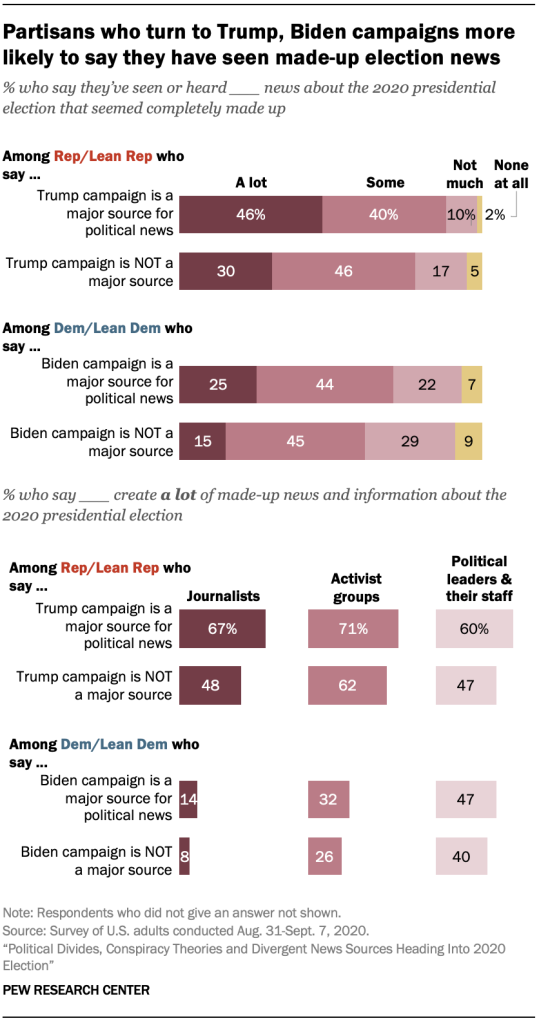
Republicans who rely on Trump and his campaign as a major source of political news are more likely than other Republicans to say they have come across a lot of made-up news, and they place more blame on certain groups for creating it.
Republicans who turn to Trump and the campaign as major sources for news are more likely to say three of the five groups asked about create a lot of made-up news: politicians, activist groups and journalists. But the greatest discrepancy occurs around journalists. Two-thirds (67%) of Republicans who say Trump is a major source of news say journalists create a lot of made-up news. That is nearly 20 percentage points higher than among other Republicans (at 48%).
Again, differences between Democrats who say Biden and his campaign are major sources of news and those who do not say this are smaller.
Demographically, young adults are less likely to call out politicians, activist groups and journalists as creators of completely made-up news. About a third (32%) of 18- to 29-year-olds say political leaders and their staff create a lot of made-up news. That compares with 42% of 30- to 49-year-olds and half or more of those ages 50 to 64 (50%) and 65 and older (56%). Similarly, a quarter of 18- to 29-year-olds say activist groups create a lot, less than the 41% of those ages 30 to 49 and the half or more of the two oldest age groups who say the same. And just 20% of those under 30 say that journalists create a lot of made-up election news, about on par with those ages 30 to 49 (24%) but lower than those ages 50 to 64 (34%) and those 65 and older (39%).




